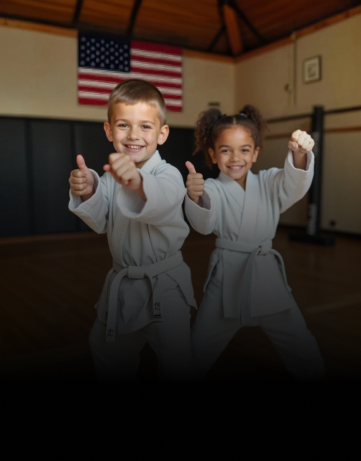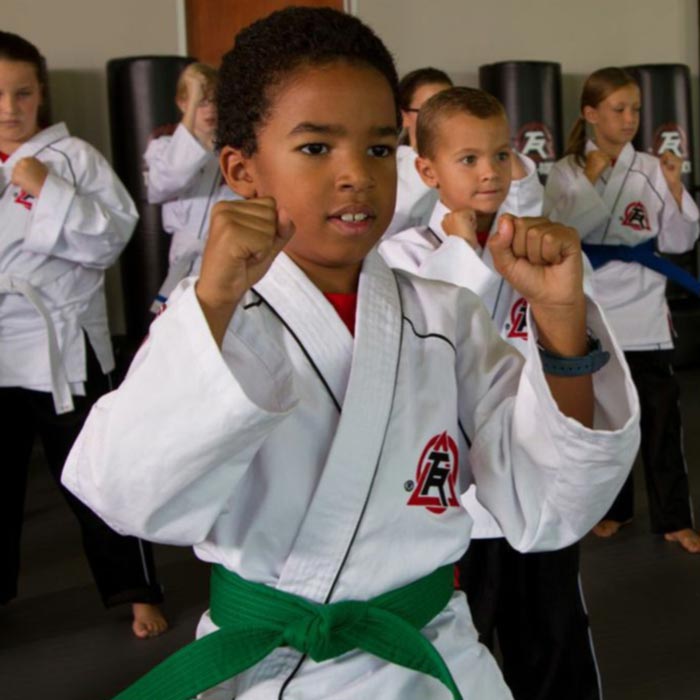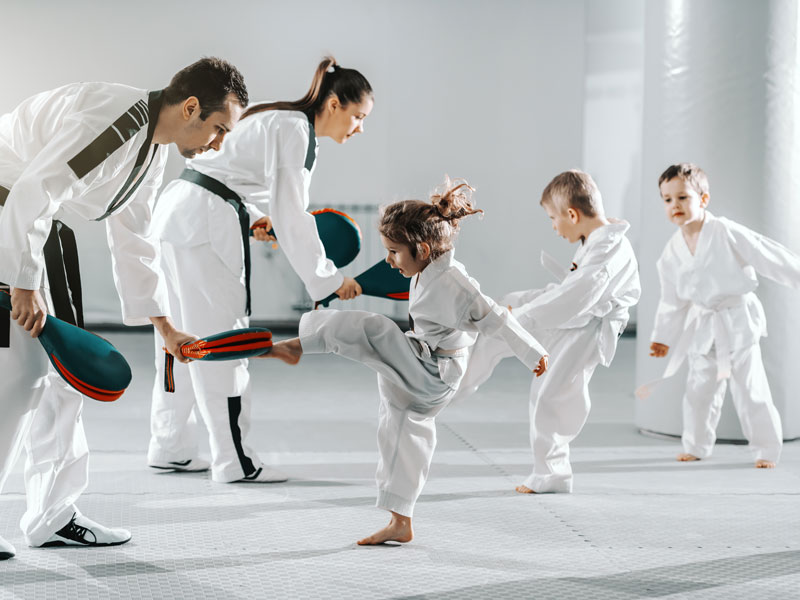Legacy Martial Arts – Discover the Legacy of Mastery in Youth Martial Arts
Legacy Martial Arts – Discover the Legacy of Mastery in Youth Martial Arts
Blog Article
Just How Martial Arts for Kids Can Increase Confidence and Discipline in Youthful Martial Artists
Karate for children uses a special chance to build self-confidence and technique in young martial musicians. As they discover new strategies and face difficulties, they not just acquire skills however also create a solid sense of self-regard. This structured atmosphere urges them to appreciate the trip of renovation. However how does this training translate into their day-to-day lives? Discover the deeper connections that make karate greater than just a sporting activity.
The Importance of Self-confidence in Childhood Growth
Self-confidence is a crucial structure block in childhood years growth. When you nurture your youngster's self-worth, you encourage them to face obstacles, take risks, and express themselves openly. Kids with self-confidence are more ready to explore brand-new tasks and social situations, which can result in long-term friendships and beneficial experiences.Encouraging your youngster to step out of their convenience zone fosters durability. They discover that failing isn't completion but rather a stepping stone to success. By celebrating their accomplishments, no issue how small, you help them acknowledge their abilities and worth.In this trip, assistance and positive reinforcement from you play an important function. Whether it's via appreciation or merely being present, your involvement improves their confidence. As they grow, this self-assurance ends up being a long-lasting possession, furnishing them to browse both obstacles and possibilities with a strong feeling of self.
Just How Karate Teaches Discipline and Focus
Martial arts assists you develop technique and focus with its organized training routine. As you exercise mindfulness throughout each session, you'll discover to concentrate much better both on and off the floor covering. Plus, setting and accomplishing goals in martial arts strengthens your capability to stay mindful and committed.
Structured Training Program
While you involve in karate training, you'll quickly uncover exactly how an organized program imparts discipline and emphasis in young practitioners. Each course adheres to a details style, including warm-ups, technique practice, and sparring. This consistency instructs you to devote and value the procedure to renovation. As you discover kinds and methods, you create a feeling of obligation for your very own progress.The organized environment motivates you to establish objectives, whether understanding a new belt or developing a kata. You'll locate that staying concentrated throughout drills and courses develops your focus. The discipline you grow in martial arts prolongs past the dojo, positively affecting your schoolwork and everyday regimens. Each session enhances the relevance of dedication, assisting you turn into a more self-displined person.
Mindfulness in Technique
As you practice karate, you'll locate that mindfulness becomes an important part of your training. Each move requires your full interest, assisting you remain concentrated on the present minute. You'll learn to tune out disturbances and focus on your breathing, activities, and intentions. This heightened recognition sharpens your reflexes and enhances your discipline.During sparring or forms, you'll uncover the importance of being mentally existing - Karate Salisbury MD. You'll discover exactly how this focus not just boosts your technique but additionally builds your self-confidence. By practicing mindfulness in martial arts, you grow persistence and durability, necessary qualities that expand past the dojo. By doing this, martial arts instructs you to harness your mind, assisting you develop a self-displined strategy to obstacles both on and off the floor covering

Objective Setting Techniques
Setting goals in martial arts isn't practically making belts; it's an effective way to cultivate discipline and focus. When you establish certain, achievable targets, you produce a roadmap for your progression. For example, rather than simply intending to improve your kicks, try concentrating on understanding a certain strategy monthly. This strategy maintains you determined and engaged.Breaking down bigger objectives right into smaller sized, workable actions helps you track your development and celebrate little triumphes along the means. Whether it's refining your position or increasing your sparring endurance, every goal strengthens your commitment. As you accomplish these goals, you'll develop confidence in your skills and develop a strong sense of technique that expands past the dojo right into everyday life.
Building Resilience With Martial Arts
Fighting style, particularly martial arts, provides kids a distinct chance to develop resilience in a supportive atmosphere. In classes, they face obstacles that press their limitations, whether it's sparring or understanding a brand-new method with a partner. Each problem, like a missed kick or a shed suit, ends up being a possibility to learn and grow.As they practice, children discover to embrace discomfort and keep attempting, even when points obtain challenging. They find that failure isn't completion; it belongs to the trip. This frame of mind assists them recover more powerful, not simply in the dojo, but in day-to-day life.With each difficulty they get over, your child constructs confidence in their ability to deal with obstacles, sustaining their determination. With martial arts, they'll comprehend that durability isn't practically physical toughness; it has to do with mental grit and perseverance, encouraging them to encounter whatever life tosses their method.
The Role of Regard in Martial Arts Educating
Respect is a fundamental principle in karate training, cultivating a culture of discipline and camaraderie among pupils. When you step onto the dojo flooring, you're not just learning strategies; you're also learning to respect your trainers, peers, and the art itself (Karate Salisbury MD). Bowing at the start and end of course isn't simply a formality; it represents your recommendation of others' initiatives and dedication.As you develop mutual respect, you'll find it improves your understanding experience. You'll pay attention extra attentively to your trainer and gain insights from fellow trainees. This setting urges useful objection and assistance, allowing every person to grow together.Moreover, respect cultivates self-discipline. Identifying the worth of effort and humbleness aids you stay concentrated on your training. In turn, this respect translates right into your everyday life, enhancing your interactions and connections outside the dojo. Through karate, you learn that regard is crucial for individual development and neighborhood building
Setting Objectives and Attaining Success in Martial arts

Social Abilities and Teamwork in the Dojo
While training more info in the dojo, youngsters normally create essential social abilities and teamwork abilities. As they practice along with peers, they learn to communicate successfully, share space, and assistance one an additional. Each course offers chances for cooperation, whether it's throughout companion drills or team workouts. This team effort promotes friendships and develops a feeling of belonging, making the dojo a nurturing environment.Kids additionally obtain useful conflict resolution skills. When they experience difficulties, such as arguments during sparring, they learn to navigate these situations constructively. They exercise perseverance and compassion, comprehending that everybody has various staminas and weaknesses.Moreover, taking part in group activities grows a feeling of responsibility. You'll see your kid finding out to rely upon teammates and take responsibility for their role in a team. These experiences not just improve their martial arts journey however additionally furnish them with social devices they'll carry right into other locations of life.

The Long-Term Perks of Martial Arts Beyond Childhood
As youngsters mature and shift right into adulthood, the benefits of martial arts expand much past the dojo. You'll locate that the discipline and focus discovered via karate can equate into your academic and professional life. Setting and accomplishing goals in fighting styles promotes a strong job ethic, which can press you to stand out in any type of endeavor.Moreover, the confidence gained from grasping techniques and competing can boost your self-worth, helping you take on difficulties head-on. This strength comes to be invaluable as you deal with the uncertainties of adulthood.Additionally, the social skills established via teamwork and sociability in the dojo can cause better connections in both individual and expert rounds. You'll learn to interact effectively, willpower problems, and build an encouraging network.Ultimately, karate shapes not just skilled martial musicians, yet all-around people all set to take on the globe.
Regularly Asked Questions
What Age Is Finest to Beginning Karate for Kids?
You can begin karate as early as age 4 or 5, but it usually depends on your kid's maturation and passion. Discovering a course that matches their age and energy level makes a huge difference.
Exist Any Health And Wellness Perks From Exercising Martial Arts?
Yes, practicing karate offers many wellness advantages. You'll enhance your flexibility, sychronisation, and stamina while improving cardio health and fitness. Plus, it enhances emphasis and mental wellness, making it a superb selection for total physical and psychological health.
How Frequently Should Kids Attend Martial Arts Courses?
You need to urge your youngsters to go to karate classes a minimum of two to 3 times a week. Uniformity assists them discover strategies properly and establish skills, making their experience more satisfying and gratifying over time.
Can Karate Aid With Taking Care Of Stress And Anxiety in Kid?
Yes, karate can help take care of stress and anxiety in kids. It shows focus and self-control while providing a secure outlet for power. You'll see your kid growing extra positive and tranquil as they practice frequently.
What Gear Is Required for Kids Starting Martial Arts?

Report this page